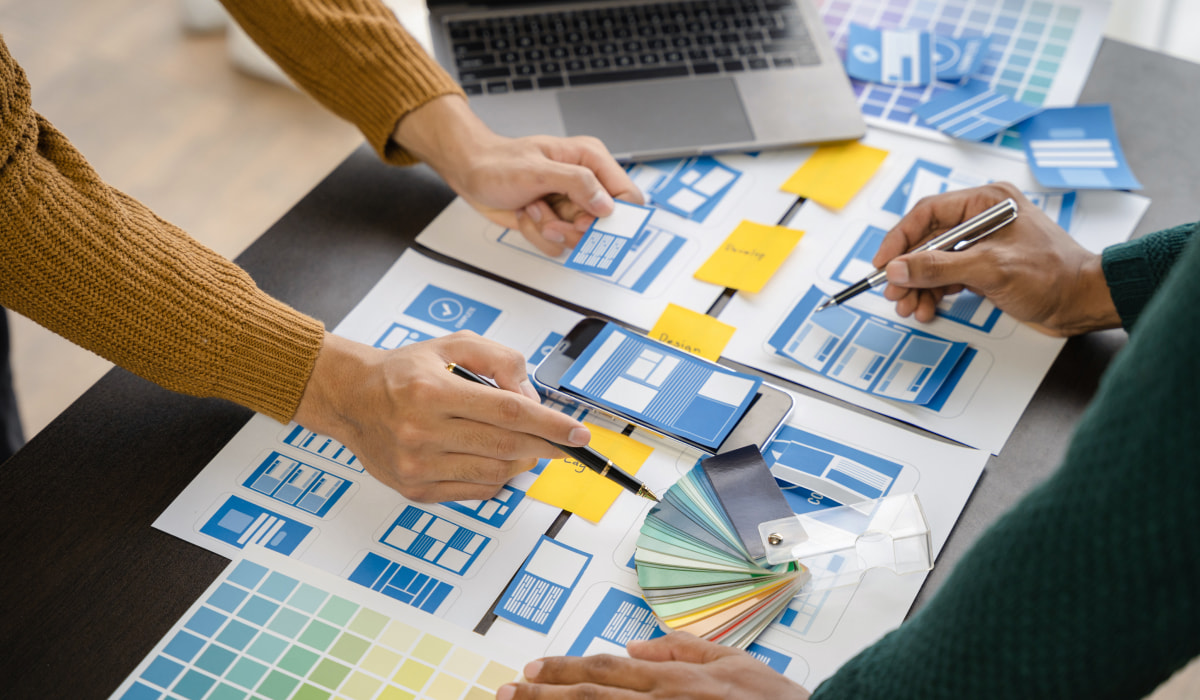10 Questions to Always Ask a Web Designer
Good web design can make or break a brand. Virtual Window finds that 48% of people said that web design was the top way they determine the credibility of a business. User experience is a major way that consumers judge the validity of a brand or a website.
According to Top Design Firm's report, 42% of people say they would leave a website because of poor functionality. That means it’s not enough to just have a website, but one that considers design and user experience.
A well-designed, UX-minded website ensures that you make the best possible impression on potential customers. However, at Vaulted, we know the website process can be daunting. That’s why we wanted to break down the basic process for web designers and the right questions to ask your web designer, so you can get the functional, well-designed web presence you need.
First, let’s break down what designers prepare for web design projects and what the process looks like broadly.
How Web Design Agencies Prepare

When an agency prepares to do a web design project, they have to consider the following:
- Budget
- Deliverables
- Milestones
- Timeline
All of the above are vital elements to a successful web design project. In addition, paired with design, this also puts the marketing, branding, and administrative work that goes into a website in perspective. Ultimately, this preparation ensures that both parties, you and the agency you’re working with, know what to expect and when to expect it.
Web designers also need to plan for the terms and conditions for the work to take place. The terms and conditions includes knowing when payments will be received and with what deliverables. In addition, the terms and conditions in the final scope of work will include the milestones and the overall timeline. Establishing the framing of the terms and what to expect will give a web design agency a better idea about the potential project. When you talk to web designers about potential projects, you need to make sure that you have the potential terms and conditions in mind.
Once you talk through these details, you and the designer can be on the same page about what your future web design will look like. By breaking down each of these items, you can begin to see how they will take their creative vision to help you reach your business goals. Then, you can get into the nitty gritty with audience analysis, personas, customer experience, and the architecture of your site.
However, if you don’t work in web design and UX daily as we do at Vaulted, you may not have the vocabulary to ask the right questions. To help you in seeking out designers, we assembled a list of key questions you can ask to figure out if a designer is right for your project.
Below, we’ve broken down each question and why it is essential to ask when you start having conversations with web designers at marketing agencies.
The Right Questions to Ask a Web Design Team

1. Will You Do a Discovery of the Project?
The first thing you should ask a web designer is about the discovery process. Discoveries are crucial because they allow you to know the project's direction and start making decisions. Through communicating with you and your existing materials, discovery enables the designer to determine the best way forward.
When asking about discovery, you should also ask what the project looks like. The web designer should be able to answer how many meetings will deal with discovery and what they need from you to ensure the process goes smoothly.
A good designer will always do a discovery process, so if you ask them and they don’t have a framework in place, that should give you pause about choosing to hire them for your project.
2. How Will We Define the Target Audience for the Site?
Next, you should talk about who is visiting the site and what their motivations are. To be able to create the best outcomes with the design and UX of the website, your web designer needs to understand your audience.
As a part of that, your web designer may do persona exercises to help decision-making in design and UX overall. Personas allow you and the web design team to understand the types of people that will be seeking out your website. This knowledge of customer behavior and experience is crucial to good design.
If the designer does not mention conversations about your audience or personas, they might not be the best pick for designing your website. Good designers are always thinking about the impact of the audience on design.
3. Does My Project Need Wireframes?

You should ask your designer about wireframes, because they will help you understand the project better. A wireframe is the skeletal framework in a website. Typically delivered in several 2D schematics, they help establish how the user moves around on the site and how much content should be on each page.
Knowing that a designer will do wireframes lets you know that they are thinking about your users and the overall experience of your website. This also lets you know that you’ll better understand what to expect in the design.
Without wireframing being built into the project from the beginning, you could be in the dark. For that reason, ask about wireframing and what that means for the project.
4. Will You Prepare Prototypes? How Will Those Be Delivered?
Like wireframes, it’s also vital that you get prototypes from the designer so that you can understand the look and feel of your website. High-fidelity mockups should be delivered as prototypes and presented to the client to step through the website, particularly for bigger site projects.
Additionally, there should be examples of repeated components, like clickable links, buttons, navigation, and interaction. While not necessary, it’s also nice to have animation prototypes and mockups.
Ask about the prototypes you will be getting and when to expect them. The web designer should be able to explain the general approach with prototypes and what to expect.
5. Will You Be Creating a Responsive Mockup?
In addition to prototypes of the website for desktop, you should also see how the website will perform on mobile. Responsive design, or the website design specifically for mobile, should still provide a complete experience on a smaller screen.
Many people navigate the internet solely with smart mobile devices, so your website design should accommodate that. In fact, according to Oberlo, as of February 2023, 52.08% of the total web visits are on mobile, compared to 47.92% from desktop browsing. Half of your audience and even some of the personas your web designer develops will likely find your website on mobile browsers. Knowing what their experience will be like is crucial to a strong website.
Ask your web designer about responsive mockups and how they shift design for mobile usage. Understanding usability on desktop and mobile is crucial for a strong website, so you must ensure your web designer can deliver.
6. What Information Do I Need to Provide to You Upfront?

You also need to ask your web designer what they need from you. Typically, you’ll need to provide the following:
-
Existing Content
-
Site Imagery
-
Brand Colors
-
Brand Logos
If you plan to change or shift any of the branding elements of your website, you and your designer can work together or with an agency to create those. However, providing what currently exists and what needs to change is essential for the web designer to know.
Asking the web designer what they need will also give you a good idea about their process. A good designer will want these from you and a survey about what your pain points are with your current website so that they can make improvements.
7. What Are the Deliverables I Will Receive in the Web Design Process?
When talking to a web designer, the most important thing is to ask what you will get at the end of the process. Ask about the deliverables, as this will clue you in to know what to expect. This should also be in the scope of work, so you know you will get each of these items for your fee.
Ask about the deliverables when speaking to web designers so you know what you will get at the end of the process. For example, that could include prototypes, design elements, branding, and the final website. A good web designer should be able to talk you through potential deliverables and what you will receive in the process.
8. How Will We Meet to Discuss the Project?
Just like asking about deliverables, you should also ask about meetings where you discuss each item on the list. The web designer should have regular milestone meetings baked into the process so there is communication and check-ins. This is also the time when you check on the status of deliverables. Having these regular meetings establishes accountability for both parties.
If the web design firm you’re speaking to doesn’t have regular meetings baked in, you could be left in the dark. Make sure they have a reasonable calendar of meetings, so you know you will get every single deliverable you need for a polished website.
At Vaulted, we allow our clients to schedule meetings through Hubspot. With the ability to request meetings throughout the process, that ensures that the people we work with are never in the dark.
9. How Many Rounds of Revisions Do I Get on Each Page?
It’s normal for the first draft of your website to need some changes to align your vision with the final product. Thus, you must also ask about revisions to know what to expect to ensure the site fully meets your needs. Ask how many revisions you get on each page or asset so you see the designer’s standard revision process. These revisions should also be baked into the scope of work so it’s a natural process.
Checking in on the different revisions will help you know what to expect and how much input you will have on the process. Depending on your industry and specific needs, the revision process may determine whether a designer is right for you or not.
10. Do You Have Any Case Studies That Relate to My Industry?
Finally, you need to get a sense of the designer’s previous work experience. This helps you understand their experience as a designer and what industries they have worked in. You want to find a designer that understands the specific requirements for websites in your industry. For example, if a web designer has exclusively worked with developing local law firm websites, they might not be the right fit for an enterprise data security company’s needs.
That’s why you should ask them for case studies and other examples of work. The designer should have similar projects to yours depending on experience level. In addition, this is an excellent way to see how a designer works with other clients to address needs and create a successful project.
In the case study, focus on the specific problems they solved and evaluate if some of their approaches could help with your pain points. By looking at the experience, you can determine if they’re a good fit for your project.
Need More Insights on Web Design?
While this was a broad overview of the process for web designers and what questions you need to ask when talking to agencies, there’s likely still information you need about web design. At Vaulted, we’re always happy to talk to you more about the process and about any of your web design strategy.
Our team is dedicated to creating tangible results with an integrated approach to marketing, branding, and web design. We believe in the unlimited potential of our clients and collaborate with them to transform vision into reality.
Our web designers use branding and design to align your values and business strategies with your customers' needs and perceptions. Vaulted does this to help you tell your story to the right people.
If you’re interested in learning more, please reach out, and we’d be happy to chat with you about web design.
Search by Tags
Be the First to
Know Subscribe to Our Newsletter!
Discover More Insights

The Integration That Disrupted Marketing, and the Architecture That Restored Momentum
When VenturEd Solutions migrated to HubSpot, they expected clearer attribution, stronger lead flow, and better alignment with Salesforce. Instead, a difficult implementation left both systems crippled.

Using HubSpot Like a Flip Phone? A Development Agency Can Fix That
. You know that feeling when you buy a fancy new phone, but all you use it for is texting and the occasional phone call? That’s what it’s like for some businesses using HubSpot. They invest in the platform packed with powerful tools and end up using just a sliver of what it can actually do. They sign up, poke around a bit, maybe send a newsletter or two, but never really unlock its full potential.

 Melissa Hunsberger
Melissa Hunsberger
